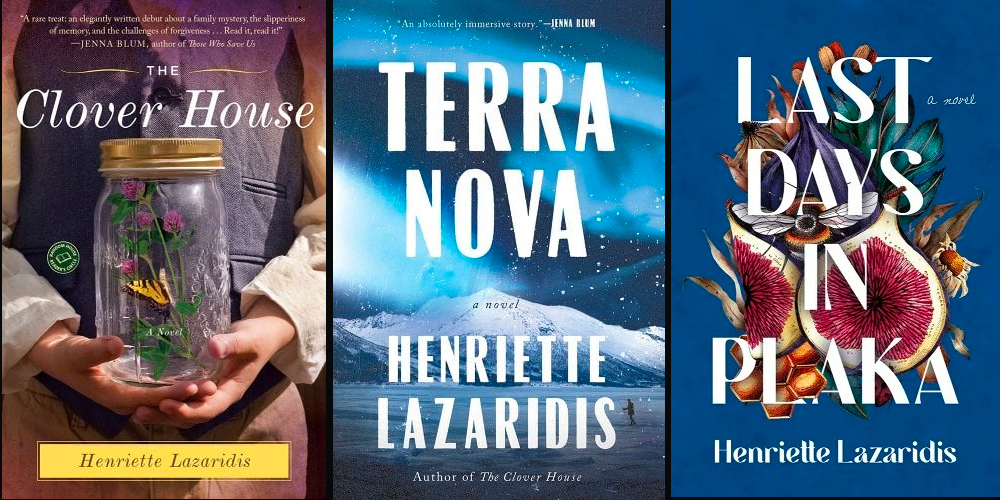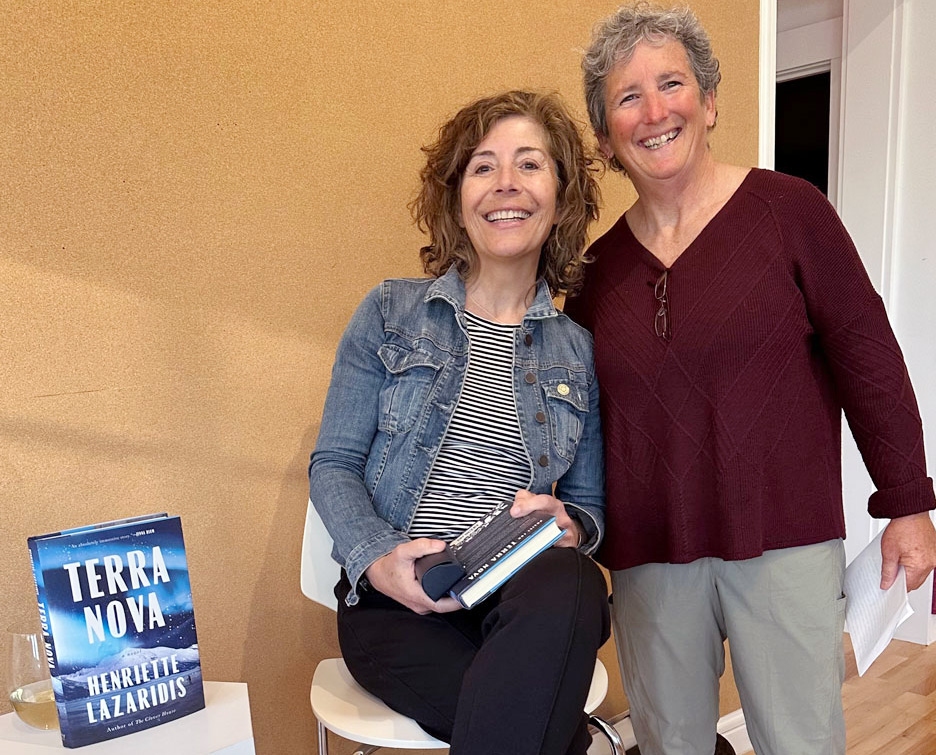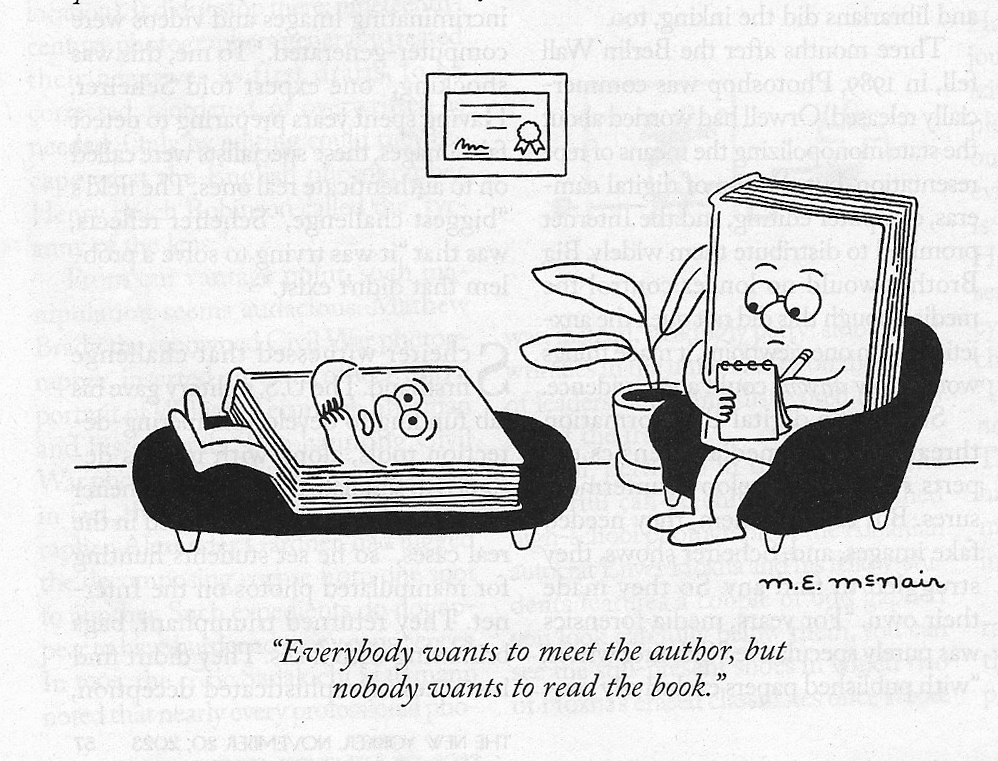A recent New Yorker cartoon made me chuckle: “Everyone wants to meet the author, but nobody wants to read the book.” The reverse can also be true: sometimes, you just want to read the damn book.
What’s extremely rare is to enjoy both the author and the writing they produce. For me, one of those wonders is Henriette Lazaridis. For one thing, she is the only other author I know who’s also a serious athlete: rower, skier, and most recently marathoner (she ran Athens!). So her posts intertwine recent race results with news about her next novel, which definitely makes me feel just a little less… odd.

Her books also make me feel less odd, because they don’t come out on a regular schedule—and they cover a very wide range of geography and word counts. Her 2013 debut, The Clover House, switched between the perspectives of daughter and mother in two different timelines: 21st century Cambridge (Massachusetts), and Greece on the eve of World War II. I was so inspired, I signed up for a seminar she led that helped me figure out what she called “the book you are really trying to write.”
Henriette’s second novel came out in 2022. Terra Nova tells a fictionalized version of two men and their very real race to the South Pole in the early 1900s, enriched by the perspective of the woman photographer who loves them both. Last spring, I convinced Henriette to talk at our local independent bookstore, Curiosity & Co, and my book group also read Terra Nova. In short, I did everything I could to spend more time with both the woman and her writing.

And in April 2024, a third and very different book comes out: Last Days in Plaka, set in present-day Athens. It’s hard to imagine any greater contrast, from the freezing cold of the Antarctic (I read Terra Nova under a blanket) to the dry heat of August in Greece (consume before the air gets too sultry, or you might have to install air conditioning). It’s quite a bit shorter, too.
I was lucky enough to read an advance copy, and I loved exploring a city I knew only during its pre-Olympic 2004 frenzy. I also enjoyed the unlikely friendship between a very old woman and a very young one, and the book’s opening; an intriguing sentence (“This is not her story.”) that instantly begs a question: which her? The second sentence answers, like a call and response with the reader: “She stole it from the young woman who did not realize until the end that it was hers.” Which begs a second question: If it’s not about the older woman, why start there?
After learning that she is a neighborhood fixture “not much inclined to shame,” we witness their first meeting:
“When the young woman stopped at the old woman’s apartment to deliver a basket of fresh figs from the priest’s family while he was still at weekday service, no one would have expected her to stay for conversation, especially not the young woman herself who had something else to do. But our story thief, our beauty—Irini is what we will call her—invited the young woman up for tea and encouraged her to eat two figs from the basket and poured a glass of lukewarm water for her to drink, and she did not send the young woman down the stairs into the square until the rooftop cinema across the way had begun its early show and bats were swooping through the mulberry trees.”
Like my own work, Henriette’s novels could be called “quiet.” Unlike my books, there is seldom a wasted word—and such a strong sense of location that you feel the heat (or cold) as you read. How do you do that? I asked, about Terra Nova. Henriette explained that she wrote the first draft longhand, huddled over an early-morning kitchen table in the depths of a Cambridge winter, so some of her own shivering worked its way onto the page. After finishing Last Days of Plaka, I asked how she wrote the dry heat of Athens in August that’s so draining, even most locals find a way to flee. “Honestly, this book came upon me without invitation,” she replied. “I think it grew from the combination of my missing Athens terribly during the pandemic combined with my greater awareness that time was/is running out for us all, as mortals. The days were so precious and the pandemic made me feel like we were wasting them. Those two things put together seem to have created the image of the woman and the basket of figs, and it just grew from there!”

Pre-orders are one of the best ways to support authors (learn why here), and through bookshop.org a portion of your purchase will also benefit the local bookstore of your choice. Meanwhile, I’m going to ask Henriette to include Curiosity & Co. in her next book tour—if only to bring a little more heat with her this time around. Because—unlike most of the novels I devour—I really do want to “meet” this particular author (again).
Got a favorite author, or one who proved a disappointment in person? Add a comment below or send me an email (even if it’s yours truly). I read all the thoughts you share, with gratitude.
For more info, visit Henriette’s website or visit Galiot Press.
Like my own work, Henriette’s novels could be called “quiet.”
Quiet is good. Quiet is being alive and a lot of times talking about the essence of living. Huge drama protagonists could be thought of as trying to get to quiet but can’t imagine ever arriving there without putting everyone else through a whole lot of drama. Quiet writing ✍️ is good!
Thanks Larry, agreed!